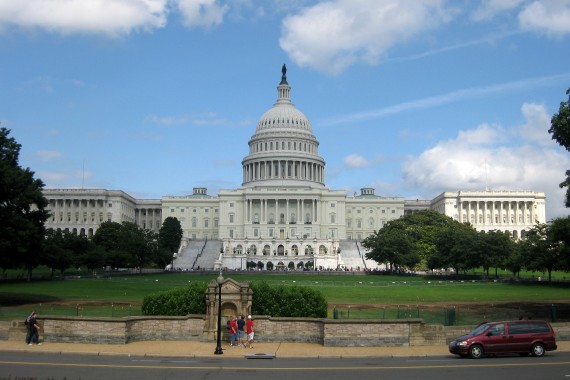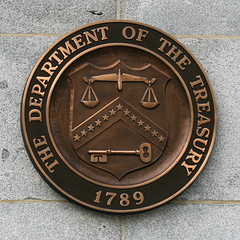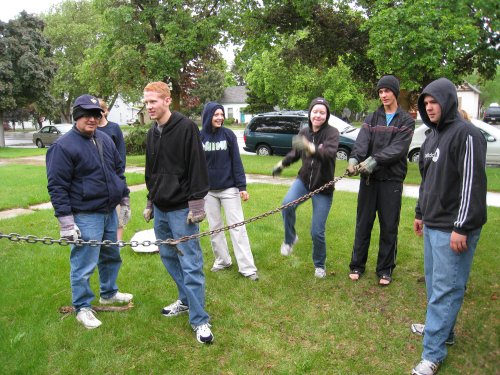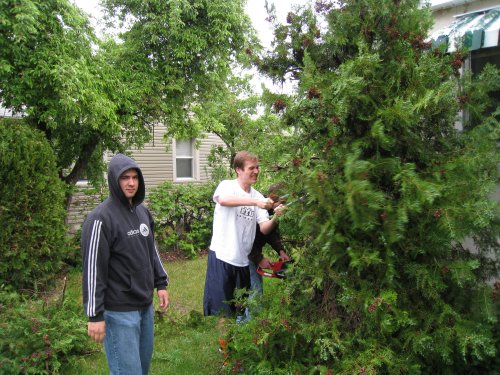Last month from January 17-23, Philadelphia became the first city in nearly 50 years to reestablish National Thrift Week. National Thrift Week was an American social movement that was begun in 1916 and continued until 1966, when it was abandoned.
Apparently for many, thrift has been a forgotten virtue for the last few decades but it is now making a comeback. Let’s look at what the original National Thrift Week was trying to accomplish and then follow up with quotes from Mormon Church presidents because for Mormons at least, thrift never went out of style.
National Thrift Week
In 1922, according to the New York Times, the committee in charge of National Thrift Week emphasized:
- Enrolling 500,000 individuals to operate their finances on the budget plan. State Thrift Week committees had quotas.
- Observance of Benjamin Franklin’s birthday in cooperation with schools, patriotic societies and businesses. Franklin was a keen practitioner of thrift.
- Thrift is “common sense applied to spending.”
- Visits by school children to banks and trust companies after school and banking hours.
The National Thrift Week program had a ten-point program such as “work and earn” to increase production; “make a budget” to plan expenditures in advance; “pay your bills promptly” to avoid the curse of debt; “invest in reliable securities” such as Liberty bonds; and “share with others” by giving to the church and other worthy causes.
Mormon Church Presidents Speak on Thrift
While Mormons do not need a National Thrift Week to encourage thrift, nevertheless additional focus on this excellent virtue is welcome. As a Mormon, I have heard thrift and preparedness preached over the pulpit for decades. I suppose that it has been continuously spoken of because not all Mormons have been listening. However, many members have heeded the exhortations of their leaders and have prospered accordingly.
The following are quotes on thrift, self-reliance, and giving by the last eleven presidents of The Church of Jesus Christ of Latter-day Saints from 1901 to the present. These pronouncements carry considerable weight with most members of the Church, even after a president has died.
Joseph F. Smith
6th President, served: 1901–1918
“…I met a brother—I need not call his name, for he is but one among thousands who can bear the same testimony, not only by the word of mouth but by the evidences of thrift, of prosperity, of progress and of improvement which surround him in the midst of the deserts.
This season he has gathered in rich harvests, his farms having produced in abundance, while the farms of many of his neighbors are clogged with weeds, and their harvests have been only one-half or one-third what his has been.
How do you account for it? I account for it in the fact that God has blessed him; and so does he, for he is an intelligent man, a man that not only labors wisely and prudently, but in the fear of God, and in the desire of his heart to obey his laws.”
“Chapter 31: Obedience to the Law of Tithing,” Teachings of Presidents of the Church: Joseph F. Smith
Heber J. Grant
7th President, served: 1918–1945
“Our primary purpose was to set up, in so far as it might be possible, a system under which the curse of idleness would be done away with, the evils of a dole abolished, and independence, industry, thrift, and self-respect be once more established amongst our people.
The aim of the Church is to help the people to help themselves. Work is to be re-enthroned as the ruling principle of the lives of our Church membership.”
Conference Report, October 1936, 3
George Albert Smith
8th President, served: 1945–1951
“The Saints need to give not only of their substance but of themselves. This is the Lord’s work. This is not the work of man. If we desire to be identified with the kingdom of our Lord, the celestial kingdom, this is our opportunity to prepare—with love unfeigned, with industry, with thrift, with perseverance, with a desire to do all that is within our power to bless others, to give—not to be always feeling we must receive, but desire to give, for I say to you: ‘It is more blessed to give than to receive’ (Acts 20:35).
The gospel of Jesus Christ is a gospel of giving, not only of our substance but of ourselves, and I thank my Heavenly Father that I belong to such an organization that has been so instructed.”
Conference Report, October 1934, 52
David O. McKay
9th President, served: 1951–1970
“Giving something for nothing as a grant is contrary to the fundamental teachings of the Church. The real purpose of the Church Security Plan is to produce independence on the part of each individual, to make him self-supporting, to replace idleness with thrift and productivity.”
Joseph Fielding Smith
10th President, served: 1970–1972
At a press conference the day following his appointment as president of the Church he had expressed amazement at all the “fuss” being made over him. As the months wore on he had cause to feel even more amazed.
One minor recognition that caught his fancy, however, was that he was the holder of the oldest savings deposit account in the Zion’s Savings Bank (now Zion’s First National Bank). His father had opened an account there in his name when he was born in 1876, just three years after the bank was begun. And the account remained intact until his death in 1972.
President Smith was always a strong believer in thrift and the savings account was symbolic of that thrift.
Life of Joseph Fielding Smith, John J. Stewart
Harold B. Lee
11th President, served: 1972–1973
“In what we might liken unto a great ‘pincer movement’ of enemy forces to encircle us, we are being surfeited with the doctrine that we can get ‘something for nothing.’
When the smoke of the present frenzied social conflict has cleared away and the carnage resulting therefrom carefully counted, we shall have had proved again that we cannot get something for nothing and continue to prosper, and that the habit of giving instead of getting is the way to happiness. Then our faith in those tried and trusted virtues of thrift, self-sacrifice, and frugality will have triumphed over the vices of reckless spending, selfishness, and a disregard for decent standards of common civic virtue and morality.”
Stand Ye In Holy Places, Harold B. Lee, 337
Spencer W. Kimball
12th President, served: 1973–1985
“Now, when I was a little boy in Southern Arizona our Latter-day Saints were the pioneers. They were struggling to get their feet planted in the soil-to establish themselves. They were largely employed by others, often at pitifully low levels of income. They were the post-hole diggers, the hewers of wood and the drawers of water. They were the farm hands, the mill workers, domestic servants in the homes, the railroad section hands.
Now, I would not have you think that such work was dishonorable, nor unholy, nor improper, but it is limiting. But in my short life I have seen this people through education and thrift rise to new planes and become the leaders in the communities and hold high places in government, business, professional, social, and political affairs. I have seen them become the landowners and many of them become independent and financially secure, as well as faithful spiritually.”
Teachings of Spencer W. Kimball, Spencer W. Kimball, 381
Ezra Taft Benson
13th President, served: 1985–1994
“A sterling virtue which builds manliness and independence is frugality of thrift. ‘Waste not, want not’ has long been the clarion call.
In more recent years, however, this maxim has given way to so-called ‘deficit spending.’ Many have been teaching that we must spend our way into prosperity. How do you regard this philosophy? Have you stopped to analyze its effect upon the independence, self-reliance, and character of the individual? And what of its possible effect upon the very existence of this nation as a haven for freedom-loving men and women?
No man in debt is truly free. He who has not learned thrift and economy is constantly beset with problems and misgivings about the future. His own freedom and peace of mind are endangered. Those dependent upon him are likewise jeopardized in their self-respect and freedom.
So Shall Ye Reap, Ezra Taft Benson, 165
Howard W. Hunter
14th President, served: 1994–1995
“The basic virtues of thrift, self-reliance, independence, enterprise, diligence, integrity, morality, faith in God and in His Son, Jesus Christ, were the principles upon which this, the greatest nation in the world, has been built.
We must not sell this priceless, divine heritage which was largely paid for by the blood of patriots and prophets for a mess of pottage, for a counterfeit, a false doctrine parading under the cloak of love and compassion, of humanitarianism, even of Christianity.”
“The Law of the Harvest: As a Man Sows, So Shall He Reap”, Howard W. Hunter, BYU Devotional, March 8, 1966
Gordon B. Hinckley
15th President, served: 1995–2008
“I commend to you the virtues of thrift and industry. In doing so, I do not wish you to be a ‘tightwad,’ if you will pardon that expression, or to be a freeloader, or anything of the kind.
But it is the labor and the thrift of people that make a nation strong. It is work and thrift that make the family independent.
Debt can be a terrible thing. It is so easy to incur and so difficult to repay. Borrowed money is had only at a price, and that price can be burdensome. Bankruptcy generally is the bitter fruit of debt. It is a tragic fulfillment of a simple process.”
“Thou Shalt Not Covet,” Ensign, March 1990, 4
Thomas S. Monson
16th President, served: 2008-
“Industry, thrift, self-reliance continue as guiding principles of this effort. As a people, we should avoid unreasonable debt.”
Thomas S. Monson, “Goal beyond Victory“, Ensign, Nov. 1988, 44
“Many more people could ride out the storm-tossed waves in their economic lives if they had their year’s supply of food and clothing and were debt-free. Today we find that many have followed this counsel in reverse: they have at least a year’s supply of debt and are food-free.”
President Thomas S. Monson, “That Noble Gift—Love at Home,” Church News, May 12, 2001, 7
Sources
- General Conference photograph: Aaron Goodwin
- “National Thrift Week,” E. A. Hungerford, New York Times. January 15, 1922, 74
- Bring Back Thrift Week
- New Thrift
- Biographical sketches of the Presidents of The Church of Jesus Christ of Latter-day Saints
- Hat tip to Get Rich Slowly for giving me the idea for this post.










